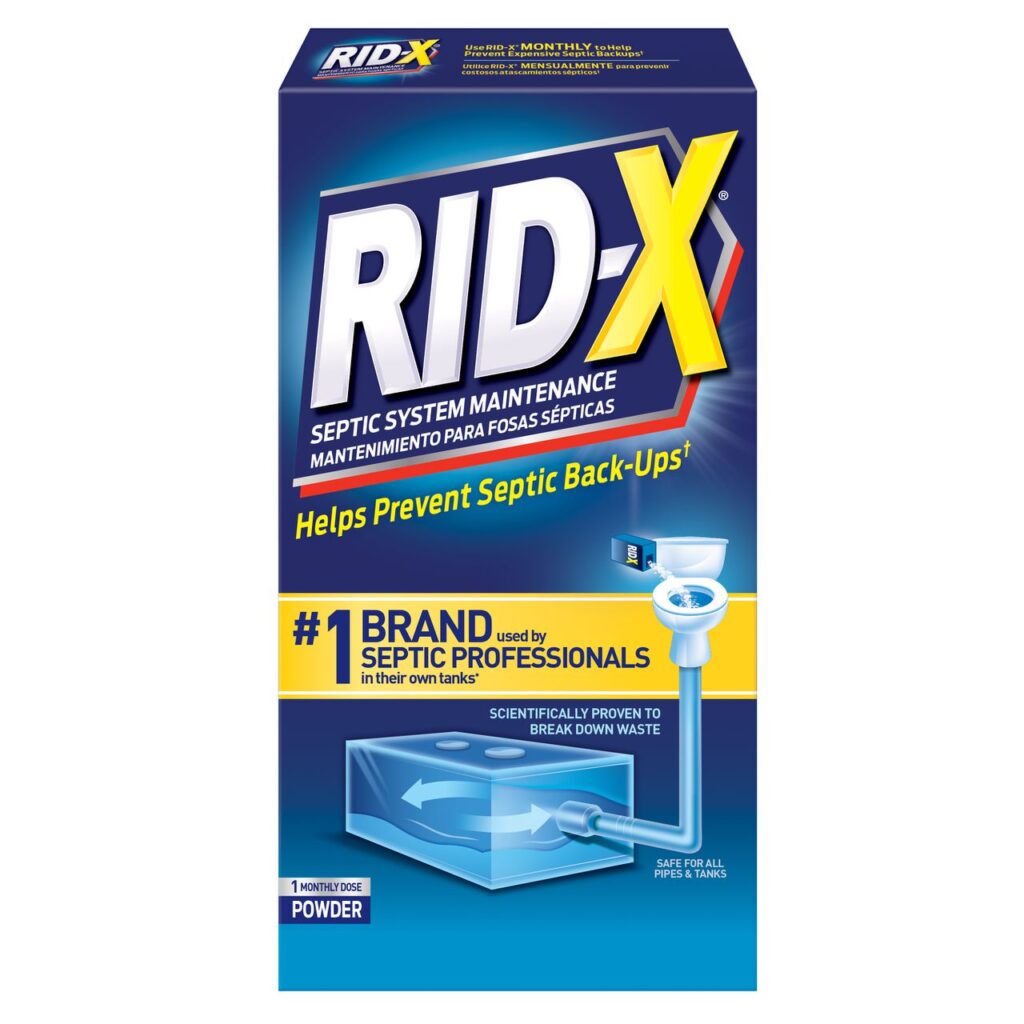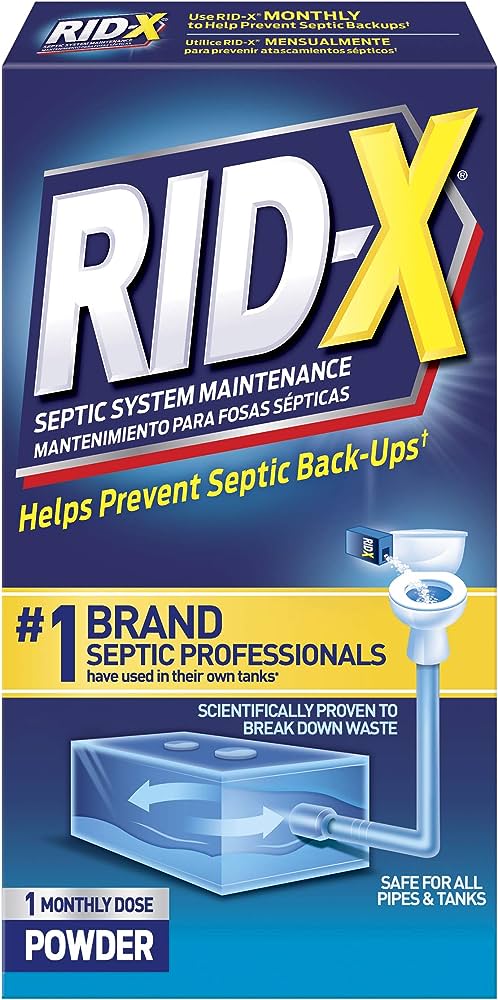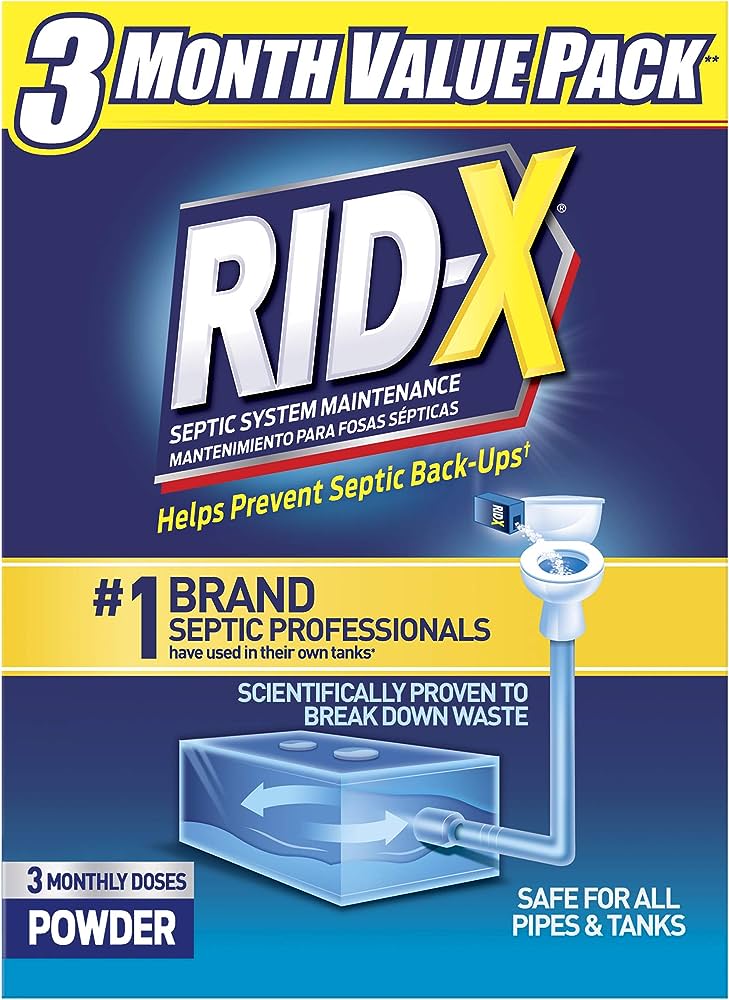Are you uncertain about the frequency with which you should be adding Ridex to your septic tank? Well, worry no more, because we have the answers you need! Maintaining a healthy septic tank system is crucial for the overall functionality and longevity of your septic system. In this article, we will guide you through the recommended frequency at which you should be adding Ridex to your septic tank, helping you make informed decisions and ensuring the smooth operation of your septic system.

What is Ridex?
Ridex is a popular brand of septic tank additive that is designed to enhance the performance and efficiency of septic systems. It is a powdered formula that contains a blend of bacteria and enzymes, which work together to break down organic matter and promote the decomposition of solid waste in septic tanks. Ridex is widely used by homeowners and recommended by professionals as a convenient and effective way to maintain the health and functionality of septic systems.
Importance of Regular Maintenance for Septic Tanks
Regular maintenance is crucial for the proper functioning and longevity of septic tanks. Without proper care and attention, septic systems can become clogged, overloaded, or even fail completely, leading to costly repairs and potential health hazards. Regular maintenance, including the use of products like Ridex, helps to prevent these issues and ensures that your septic system continues to operate efficiently.
Understanding the Role of Bacteria
One of the key aspects of septic tank maintenance is to ensure that the right bacteria are present in the tank. Bacteria play a critical role in breaking down organic matter and converting it into less harmful substances. This process keeps the septic tank free from clogs and maintains its optimal functioning. Ridex is formulated with a blend of beneficial bacteria that replenish and enhance the natural bacteria population in the septic tank, promoting efficient waste decomposition.
Preventing Costly Repairs
The cost of repairing or replacing a septic system can be substantial. Regular maintenance, including the use of Ridex, can help prevent the need for such expensive repairs. By keeping the septic tank free from clogs and maintaining the proper balance of bacteria, Ridex helps to prevent the accumulation of solid waste and prolongs the lifespan of the septic system.
Maintaining Proper Septic System Functioning
A properly functioning septic system is essential for the health and safety of your home and the environment. When a septic system is not well-maintained, it can lead to foul odors, wastewater backups, and contamination of groundwater. Ridex aids in maintaining the proper functioning of the septic system by promoting the decomposition of waste, reducing odors, and preventing system failures.

Factors to Consider
When determining the frequency of Ridex usage, there are several factors to consider that can influence the effectiveness and necessity of the product.
Size of the Septic Tank
The size of your septic tank plays a significant role in determining the frequency of Ridex usage. Larger tanks typically require more frequent applications of Ridex, as they have a larger volume of waste to decompose.
Household Water Usage
The amount of water used in your household can impact the frequency at which you should use Ridex. As the amount of water increases, so does the volume of waste that enters the septic system. Therefore, high water usage households may need to use Ridex more frequently to ensure proper waste decomposition.
Number of Occupants
The number of people living in your household can also affect the frequency of Ridex usage. More occupants equate to higher usage of the septic system, which may require more frequent applications of Ridex.
Quality of Existing Bacteria
The existing bacteria population in your septic tank can influence the need for Ridex usage. If your septic tank already has a healthy and active bacteria population, Ridex may not be required as frequently. However, if the bacteria count is low or compromised, Ridex can be beneficial in replenishing and enhancing the bacterial activity.
Frequency of Solid Waste Build-up
The rate at which solid waste accumulates in your septic tank is another important factor to consider. If your septic tank experiences frequent or rapid build-up of solid waste, more frequent Ridex applications may be necessary.
Manufacturer Recommendations
When it comes to the frequency of Ridex usage, it is important to consider the manufacturer’s recommendations. The manufacturer provides guidelines based on extensive research and testing to determine the optimal usage frequency for their product. Adhering to these guidelines ensures that you are using Ridex effectively and efficiently.
Following the Ridex Guidelines
Ridex provides clear instructions on their packaging regarding usage frequency. It is advisable to follow these guidelines to achieve the best results. Based on the size of your septic tank and the number of occupants in your household, Ridex will provide recommendations on how often to use their product.
Considering Alternative Products
While Ridex is a popular and widely used product, it is not the only option available for septic tank maintenance. There are other septic additives on the market that may be equally effective or better suited to your specific needs. It is important to research different products and consult with professionals before making a decision on which additive to use.

Industry Standards and Expert Opinions
In addition to manufacturer recommendations, it is valuable to consider industry standards and seek expert opinions when determining the frequency of Ridex usage.
General Guidelines
Industry standards often provide general guidelines for septic tank maintenance, including the use of additives like Ridex. These guidelines take into account factors such as tank size, water usage, and number of occupants to provide a baseline recommendation for usage frequency. While these guidelines can be helpful, they may not take into account specific variables unique to your septic system.
Variations Based on Variables
It is important to remember that every septic system is unique and may have specific needs that differ from general guidelines. Variables such as soil type, climate, and property layout can influence the rate of waste decomposition and the effectiveness of Ridex. Therefore, seeking expert opinions from septic system professionals who have firsthand knowledge of your specific system can help determine the optimal frequency of Ridex usage.
Potential Risks of Overusing Ridex
While Ridex is generally safe for septic systems when used as directed, overusing the product can have negative consequences. Excessive use of Ridex can disrupt the balance of bacteria in the septic tank, leading to ineffective waste breakdown and potential system issues. It is important to avoid excessive usage and follow manufacturer and industry recommendations to ensure the proper functioning of your septic system.
Assessing Your Septic Tank’s Health
Regularly assessing the health of your septic tank is essential in determining the frequency of Ridex usage and ensuring the overall functionality of the system.
Regular Inspections
Periodic inspections of your septic tank allow you to identify potential issues before they escalate into major problems. Inspections can help determine the accumulation of sludge and scum layers, the condition of the tank, and the bacterial activity. By conducting regular inspections, you can gauge the health of your septic system and adjust your Ridex usage accordingly.
Measurements of Sludge and Scum Layers
Measuring the thickness of the sludge and scum layers in your septic tank provides valuable information about the level of waste build-up. This measurement can be done using a specialized tool or by hiring a professional to perform the assessment. The thickness of the layers can indicate whether or not the tank requires more frequent Ridex applications or additional maintenance.
Consulting a Professional
If you are unsure about the health of your septic tank or have concerns about Ridex usage, it is always recommended to consult a septic system professional. These experts can assess the condition of your septic system, provide guidance on maintenance practices, and offer personalized recommendations on the frequency of Ridex usage based on your specific circumstances.

Determining the Ideal Frequency
Finding the ideal frequency of Ridex usage requires a combination of understanding your septic system’s needs and observing potential signs of trouble.
Establishing Baseline Usage
When first starting to use Ridex, it is important to establish a baseline usage frequency based on manufacturer recommendations and industry standards. This provides a starting point to assess the effectiveness of Ridex in your septic system.
Considering Manufacturer Recommendations
As mentioned earlier, manufacturer recommendations are an essential guideline for determining the frequency of Ridex usage. These recommendations are based on extensive research and testing specific to their product. Following the manufacturer’s guidelines ensures that you are using Ridex in a manner that maximizes its benefits.
Observing Signs of Septic System Issues
It is crucial to be observant of any signs that indicate potential septic system issues. These signs include foul odors, slow drains, gurgling sounds, or sewage backups. If you notice any of these symptoms, it may indicate a disruption in the proper functioning of your septic system and the need for more frequent Ridex applications.
Consulting with Experts
For a more accurate assessment of your septic system’s needs, consulting with septic system professionals can provide valuable insights. These experts can evaluate the specific conditions of your septic system, take into account variables that may affect Ridex usage frequency, and offer personalized recommendations to maintain your septic system’s health.
Alternative Solutions to Promote Septic System Health
While Ridex is a popular choice for septic tank maintenance, there are alternative solutions that can also promote the health and longevity of your septic system.
Avoiding Harmful Chemicals
One of the simplest and most effective ways to maintain a healthy septic system is to avoid introducing harmful chemicals into the system. Chemicals such as bleach, drain cleaners, and antibacterial products can disrupt the bacterial balance in the septic tank and hinder waste decomposition. Opting for eco-friendly and septic-safe alternatives can preserve the integrity of your septic system.
Implementing Regular Pumping
Regular pumping is a crucial maintenance practice for septic systems. Pumping helps remove accumulated solids from the tank and prevents clogs and backups. By scheduling regular pumping appointments, you can ensure the optimal functioning of your septic system and reduce the reliance on additional additives like Ridex.
Maintaining a Balanced Diet and Water Usage
What goes into your body eventually ends up in your septic system. A balanced diet that includes fiber-rich foods and avoids excessive fats and oils promotes better waste breakdown in the septic tank. Additionally, practicing water conservation habits, such as fixing leaky faucets and using water-efficient appliances, can reduce the strain on your septic system and decrease the need for excessive Ridex usage.
Improving Drain Field Conditions
The drain field plays a critical role in filtering and dispersing the clarified wastewater from the septic tank. Regular maintenance of the drain field, such as keeping it clear of trees and roots and avoiding parking or driving heavy vehicles on it, can contribute to the overall health of your septic system. By preserving the drain field’s integrity, you can minimize the need for additional additives like Ridex.

Common Misconceptions About Ridex Usage
While Ridex is a helpful product for septic tank maintenance, there are several misconceptions surrounding its usage that need to be addressed.
Ridex as Sole Solution for Septic Tank Maintenance
One common misconception is that Ridex is the only solution needed to maintain a healthy septic system. While Ridex is a valuable additive, it should be used in conjunction with other maintenance practices such as regular pumping, avoiding harmful chemicals, and preserving the drain field. A holistic approach to septic tank maintenance ensures optimal performance and extends the life of the system.
Overdependence on Additives
Another misconception is that excessive reliance on Ridex or similar additives can compensate for inadequate septic system maintenance. Additives can aid in waste decomposition and promote bacterial activity, but they are not a substitute for regular inspections, pumping, and other maintenance practices. It is crucial to strike a balance and use additives like Ridex as a supplement to proper septic system care.
Ignoring Other Maintenance Practices
Some homeowners may fall into the trap of solely relying on Ridex while neglecting other essential maintenance practices. It is important to remember that regular inspections, proper waste disposal, and water conservation habits are equally important in ensuring the optimal functioning of a septic system. Ridex should be used in conjunction with these practices to achieve the best results.
Additional Tips for Optimal Septic Tank Performance
To further enhance the performance and longevity of your septic tank, consider implementing these additional tips:
Proper Disposal of Household Waste
Avoid flushing non-biodegradable items or excessive amounts of chemicals down the drain. These items can clog the septic system and disrupt the bacterial activity. Dispose of solid waste properly in the trash and dispose of hazardous chemicals through designated channels rather than via the septic system.
Educating Household Members
Educate your household members about proper septic system usage and maintenance practices. Encourage responsible water usage, proper waste disposal, and the importance of avoiding harmful chemicals. By raising awareness, you can minimize the risk of actions that may harm your septic system.
Being Mindful of Water Usage
Conserving water not only reduces strain on the septic system but also helps reduce your environmental impact. Simple practices such as repairing leaks, using water-efficient appliances, and practicing shorter showers can all contribute to the overall health and longevity of your septic system.
Addressing Plumbing Issues Promptly
If you notice any plumbing issues such as leaks, slow drains, or unusual sounds, address them promptly. Ignoring plumbing issues can lead to further damage to your septic system and require more frequent Ridex usage to compensate. Timely plumbing repairs help maintain the optimal performance of your septic system.
In conclusion, regular maintenance is essential for the proper functioning and longevity of septic systems. Ridex, along with other maintenance practices, can help promote the health of your septic system by enhancing waste breakdown and reducing the risk of failures. When determining the frequency of Ridex usage, consider factors such as septic tank size, household water usage, number of occupants, and the quality of existing bacteria. Manufacturer recommendations, industry standards, and expert opinions should also be taken into account. Regular inspections, assessments of sludge and scum layers, and consultations with professionals help determine the ideal Ridex usage frequency. Additionally, implementing alternative solutions like avoiding harmful chemicals, regular pumping, maintaining a balanced diet and water usage, and improving drain field conditions contribute to the overall health of the septic system. It is important to address common misconceptions about Ridex usage and remember that holistic septic system maintenance practices are essential. By following these guidelines and incorporating additional tips, you can ensure optimal septic tank performance and avoid costly repairs.
